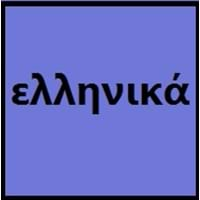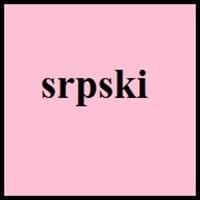Countries
Cyprus, European Union, Greece
Bosnia and Herzegovina, Kosovo, Serbia, Slovakia
National Language
Albania, Cyprus, Egypt, France, Greece, Italy, Romania, Turkey, Ukraine
Bosnia, Croatia, Montenegro, Serbia
Second Language
Roman Empire
Not spoken in any of the countries
Speaking Continents
Asia, Europe
Europe
Minority Language
Albania, Armenia, Australia, Hungary, Italy, Romania, Turkey, Ukraine
Croatia, Czech Republic, Hungary, Macedonia, Montenegro, Romania, Slovakia
Regulated By
Center for the Greek language (Κέντρον Ελληνικής Γλώσσας)
Board for Standardization of the Serbian Language
Interesting Facts
- Greek is the longest documented language of all the Indo-European Langauges.
- The official language of education in the Roman Empire was Greek.
- Serbian language was derived from the Old Church Salvic, as the language was commonly spoken by most of Slavic people in the 9th Century.
- Serbian language is based on Stokavian dialect.
Similar To
Armenian
Bosnian and Croatian Languages
Derived From
Latin
Not Available
Alphabets in
Greek-Alphabets.jpg#200
Serbian-Alphabets.jpg#200
Scripts
Arabic, Latin
Cyrillic, Latin
Writing Direction
Left-To-Right, Horizontal
Left-To-Right, Horizontal
Hello
γεια σας (geia sas)
Здраво (Zdravo)
Thank You
ευχαριστώ (ef̱charistó̱)
Хвала лепо (Hvala lepo)
How Are You?
πώς είσαι (pó̱s eísai)
Како си? (Kako si?)
Good Night
Καληνυχτα (Kali̱nychta)
Лаку ноћ (Laku noć)
Good Evening
καλησπέρα (kali̱spéra)
Добро вече (Dobro veče)
Good Afternoon
Καλὸ ἀπόγευμα (Kaló apóyevma)
Добар дан (Dobar dan)
Good Morning
καλημέρα (kali̱méra)
Добро јутро (Dobro jutro)
Please
παρακαλώ (parakaló̱)
Молим (Molim)
Sorry
συγνώμη (sygnó̱mi̱)
Жао ми је (Žao mi je)
Bye
αντίο (antío)
Довиђења (Doviđenja)
I Love You
Σε αγαπώ (Se agapó̱)
Волим те (Volim te)
Excuse Me
Με συγχωρείτε! (Me synhoríte)
Извините (Izvinite)
Dialect 1
Cappadocian Greek
Prizren-Timok
Where They Speak
Greece
Southeastern Serbia
How Many People Speak
Not Available
Dialect 2
Griko
Smederevo–Vršac
Where They Speak
Italy
Serbia
How Many People Speak
Not Available
Dialect 3
Mariupol
Torlakian
Where They Speak
Ukraine
Bulgaria, France, Kosovo, Macedonia, Romania, Serbia
How Many People Speak
Not Available
Speaking Population
Not Available
Native Name
ελληνικά
српски (srpski) српски језик (srpski jezik)
Alternative Names
Ellinika, Graecae, Grec, Greco, Neo-Hellenic, Romaic
Montenegrin
French Name
grec moderne (après 1453)
serbe
German Name
Neugriechisch
Serbisch
Pronunciation
[eliniˈka]
[sr̩̂pskiː]
Ethnicity
Greeks or Hellenes
Serbs
Origin
1500 BC
11th Century
Language Family
Indo-European Family
Indo-European Family
Subgroup
Hellenic
Not Available
Branch
Not Available
Not Available
Early Forms
Proto-Greek, Mycenaean Greek, Ancient Greek, Koine Greek and Medieval Greek
No early forms
Standard Forms
Modern Greek
Standard Serbian
Signed Forms
Greek Sign Language
Not Available
Scope
Individual
Individual
ISO 639 6
ells
Not Available
Glottocode
gree1276
serb1264
Linguasphere
56-AAA-a
53-AAA-g
Language Type
Living
Living
Language Linguistic Typology
Subject-Verb-Object
Subject-Verb-Object
Language Morphological Typology
Fusional, Synthetic
Not Available
Greek and Serbian Greetings
People around the world use different languages to interact with each other. Even if we cannot communicate fluently in any language, it will always be beneficial to know about some of the common greetings or phrases from that language. This is where Greek and Serbian greetings helps you to understand basic phrases in Greek and Serbian language. Greek word for "Hello" is γεια σας (geia sas) or Serbian word for "Thank You" is Хвала лепо (Hvala lepo). Find more of such common Greek Greetings and Serbian Greetings. These greetings will help you to be more confident when conversing with natives that speak these languages.
Greek vs Serbian Difficulty
The Greek vs Serbian difficulty level basically depends on the number of Greek Alphabets and Serbian Alphabets. Also the number of vowels and consonants in the language plays an important role in deciding the difficulty level of that language. The important points to be considered when we compare Greek and Serbian are the origin, speaking countries, language family, different greetings, speaking population of these languages. Want to know in Greek and Serbian, which language is harder to learn? Time required to learn Greek is 44 weeks while to learn Serbian time required is 44 weeks.





